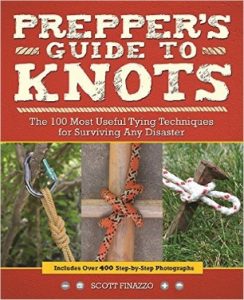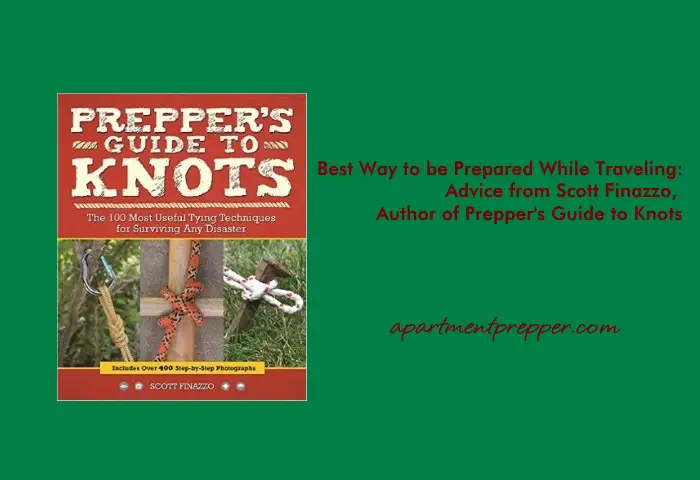This post is by Bernie Carr, apartmentprepper.com
Today we are featuring Scott Finazzo’s latest book, Prepper’s Guide to Knots.
Prepper’s Guide to Knots provides clear directions on tying various knots to help you in survival situations such as:
- Creating shelter
- Transporting an injured person
- Moving logs
- Protecting your home against intruders
- Hanging food bags to store or keep dry
Except for using paracord, I have to admit I have not spent much time tying knots until I read this book. Although the description does indicate the function of each knot, I would have liked to see photos of the knots being used. The step by step illustrations are helpful, making it easy to follow along. Now I am convinced that knot tying is a great skill to have for daily use as well as for emergencies. Prepper’s Guide to Knots is a great reference book for anyone interested in survival or spends time outdoors.

Part 2 of my interview with Scott Finazzo
Last month, we featured Prepper’s Survival Medicine Handbook and Part 1 of the interview. Scott has a wealth of knowledge about survival and preparedness. In addition to being an emergency responder, he is also an avid traveler. This time we continue our interview to focus on preparedness while traveling, everyday carry and apartment preparedness.
What is the best way to be prepared while on vacation or traveling for business?
When traveling I always to try to pre-plan what I can. For example, what is the “climate” there, and I don’t mean weather. If you travel to another country, you should go to the State Department website and check for any travel alerts. On some of my trips, wandering is part of the adventure, so I can’t pre-plan the area much because I figure it out as I go, but if I am staying in one place, I know where the nearest hospital, police, and fire stations are. I know if there are any inherent natural hazards: earthquakes, mudslides, flooding, or anything else prone to the area. Then I plan accordingly. Literally that kind of research can be done in less than an hour and can be extremely vital if a bad situation where to occur where you are a stranger in a strange land. I don’t take a stockpile of supplies, by any means, but I have done a little bit of homework and given a little bit of thought of what to do and where to go if things turn for the worse.
Provide examples of items you should carry daily
For everyday carry, I recommend a multi-tool and medical gloves. Certainly you could list a hundred things that could potentially be put to use, but in all reality, no one in their right mind would carry around, say duct tape or a fully stocked medical kit, for everyday application and they rarely go with your outfit. Gloves will allow you barrier protection in case of a medical emergency and a multi-tool gives you numerous tool and self defense options in one compact device.
What is your advice to apartment dwellers on improving their chances to survive a disaster?
Beyond basic preparedness steps, I think the most important thing that I recommend to apartment dwellers is to form a “neighborhood group”. There are a lot of resources in one compact area in apartment buildings – people with varying skill sets and areas of expertise. There is also the opportunity to combine supplies such as tools so that not everyone has to go out and buy a full complement of every conceivable supply. There may be a landscaper in the building with chainsaws and a veterinarian with pet and possibly human medical supplies. Pool your resources and knowledge base and have a plan in a advance.
The second piece of advice I would give is to really get to know your building or buildings. If you live in a downtown area and live in one large apartment building, know the stairwells and roof access. Know where the electrical room is and where to shut off water and gas to the building. Is there a freight elevator? Knowing these things will allow you to know your options when an emergency arises. If you live in an apartment community with multiple smaller buildings, you could ask yourself the same types of questions, but specific to your apartment building. How do I shut off utilities? Is there a common attic or are there firewalls that would stop the spread of fire along the top of the building? Things like that.
A big “Thank You!” to Scott Finazzo for answering our interview questions.
© Apartment Prepper 2016


